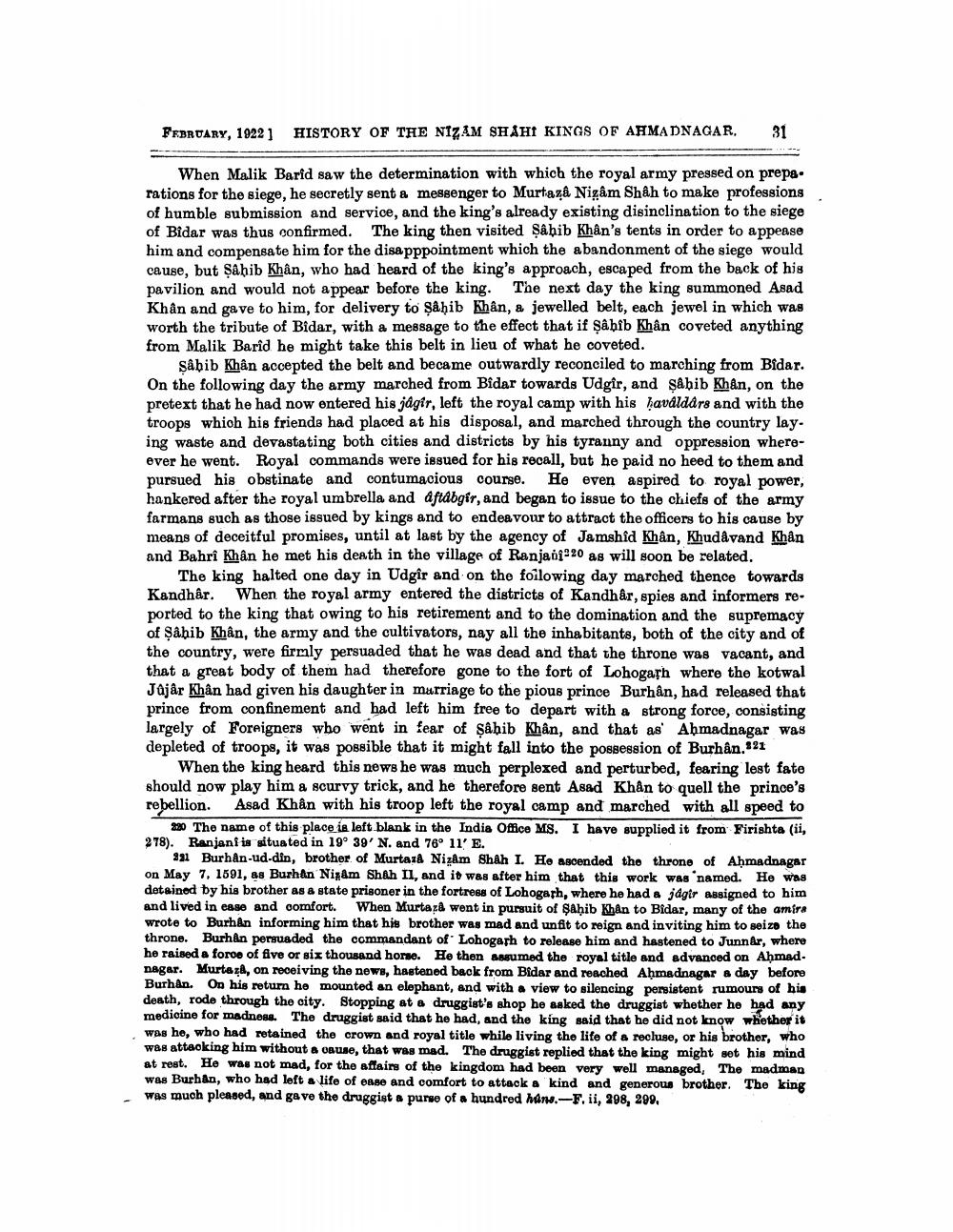________________
FEBRUARY, 1922]
HISTORY OF THE NIZAM SHAHI KINGS OF AHMADNAGAR,
When Malik Barid saw the determination with which the royal army pressed on prepa. rations for the siege, he secretly sent a messenger to Murtaza Nizâm Shâh to make professions of humble submission and service, and the king's already existing disinclination to the siege of Bidar was thus confirmed. The king then visited Şâhib Khân's tents in order to appease him and compensate him for the disapppointment which the abandonment of the siege would cause, but Sahib Khân, who had heard of the king's approach, escaped from the back of his pavilion and would not appear before the king. The next day the king summoned Asad Khân and gave to him, for delivery to Şâhib Khân, a jewelled belt, each jewel in which was. worth the tribute of Bîdar, with a message to the effect that if Şâhîb Khân coveted anything from Malik Barid he might take this belt in lieu of what he coveted.
31
Şâbib Khân accepted the belt and became outwardly reconciled to marching from Bidar. On the following day the army marched from Bidar towards Udgîr, and Sahib Khân, on the pretext that he had now entered his jagir, left the royal camp with his havâldars and with the troops which his friends had placed at his disposal, and marched through the country laying waste and devastating both cities and districts by his tyranny and oppression whereever he went. Royal commands were issued for his recall, but he paid no heed to them and pursued his obstinate and contumacious course. He even aspired to royal power, hankered after the royal umbrella and aftabgir, and began to issue to the chiefs of the army farmans such as those issued by kings and to endeavour to attract the officers to his cause by means of deceitful promises, until at last by the agency of Jamshid Khân, Khudavand Khân and Bahrî Khân he met his death in the village of Ranjani220 as will soon be related.
The king halted one day in Udgîr and on the following day marched thence towards Kandhar. When the royal army entered the districts of Kandhâr, spies and informers reported to the king that owing to his retirement and to the domination and the supremacy of Şâhib Khân, the army and the cultivators, nay all the inhabitants, both of the city and of the country, were firmly persuaded that he was dead and that the throne was vacant, and that a great body of them had therefore gone to the fort of Lohogarh where the kotwal Jujar Khân had given his daughter in marriage to the pious prince Burhân, had released that prince from confinement and had left him free to depart with a strong force, consisting largely of Foreigners who went in fear of Şâhib Khân, and that as Ahmadnagar was depleted of troops, it was possible that it might fall into the possession of Burhân.221
When the king heard this news he was much perplexed and perturbed, fearing lest fate should now play him a scurvy trick, and he therefore sent Asad Khân to quell the prince's rebellion. Asad Khân with his troop left the royal camp and marched with all speed to
220 The name of this place is left blank in the India Office MS. I have supplied it from Firishta (ii, 278). Ranjani is situated in 19° 39' N. and 76° 11' E.
331 Burhan-ud-din, brother of Murtaza Nizam Shah I. He ascended the throne of Ahmadnagar on May 7, 1591, as Burhan Nizam Shah II, and it was after him that this work was named. He was detained by his brother as a state prisoner in the fortress of Lohogarh, where he had a jágir assigned to him and lived in ease and comfort. When Murtaza went in pursuit of Sahib Khan to Bidar, many of the amira wrote to Burhan informing him that his brother was mad and unfit to reign and inviting him to seize the throne. Burhan persuaded the commandant of Lohogarh to release him and hastened to Junnar, where he raised a force of five or six thousand horse. He then assumed the royal title and advanced on Ahmad. nagar. Murtaza, on receiving the news, hastened back from Bidar and reached Ahmadnagar a day before Burhan. On his return he mounted an elephant, and with a view to silencing persistent rumours of his death, rode through the city. Stopping at a druggist's shop he asked the druggist whether he had any medicine for madness. The druggist said that he had, and the king said that he did not know whether it was he, who had retained the crown and royal title while living the life of a recluse, or his brother, who was attacking him without a cause, that was mad. The druggist replied that the king might set his mind at rest. He was not mad, for the affairs of the kingdom had been very well managed, The madman was Burhan, who had left a life of ease and comfort to attack a kind and generous brother. The king was much pleased, and gave the druggist a purse of a hundred hans.-F. ii, 298, 299,




